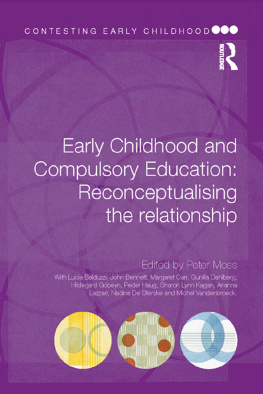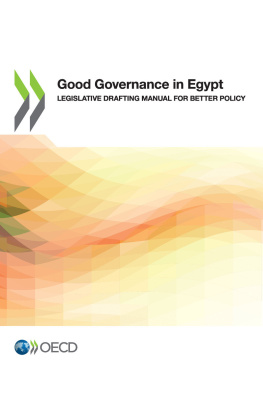OECD - Good Practice for Good Jobs in Early Childhood Education and Care
Here you can read online OECD - Good Practice for Good Jobs in Early Childhood Education and Care full text of the book (entire story) in english for free. Download pdf and epub, get meaning, cover and reviews about this ebook. year: 2019, publisher: OECD Publishing, genre: Politics. Description of the work, (preface) as well as reviews are available. Best literature library LitArk.com created for fans of good reading and offers a wide selection of genres:
Romance novel
Science fiction
Adventure
Detective
Science
History
Home and family
Prose
Art
Politics
Computer
Non-fiction
Religion
Business
Children
Humor
Choose a favorite category and find really read worthwhile books. Enjoy immersion in the world of imagination, feel the emotions of the characters or learn something new for yourself, make an fascinating discovery.
Good Practice for Good Jobs in Early Childhood Education and Care: summary, description and annotation
We offer to read an annotation, description, summary or preface (depends on what the author of the book "Good Practice for Good Jobs in Early Childhood Education and Care" wrote himself). If you haven't found the necessary information about the book — write in the comments, we will try to find it.
OECD: author's other books
Who wrote Good Practice for Good Jobs in Early Childhood Education and Care? Find out the surname, the name of the author of the book and a list of all author's works by series.
Good Practice for Good Jobs in Early Childhood Education and Care — read online for free the complete book (whole text) full work
Below is the text of the book, divided by pages. System saving the place of the last page read, allows you to conveniently read the book "Good Practice for Good Jobs in Early Childhood Education and Care" online for free, without having to search again every time where you left off. Put a bookmark, and you can go to the page where you finished reading at any time.
Font size:
Interval:
Bookmark:

OECD (2019), Good Practice for Good Jobs in Early Childhood Education and Care , OECD Publishing, Paris, https://doi.org/10.1787/64562be6-en .
The report was prepared under the overall supervision of the OECD Secretary-General, Angel Gurra, and the OECD Chief of Staff and Sherpa to the G20, Gabriela Ramos.
The OECD Directorate for Employment, Labour, and Social Affairs (ELS) prepared this report under the senior leadership of Stefano Scarpetta (Director of ELS), Mark Pearson (Deputy Director of ELS), Monika Queisser (Senior Counsellor and Head of the OECD Social Policy Division) and Willem Adema (Senior Economist in the OECD Social Policy Division).
The report was written by Chris Clarke and Antonela Miho (OECD Social Policy Division), with valuable contributions by Valerie Frey (OECD Social Policy Division) and Arno Engel (OECD Directorate for Education and Skills). Kirsten Wendland, Juliane Stahl (both German Federal Ministry for Family Affairs, Senior Citizens, Women and Youth), Christopher Prinz (OECD Directorate for Employment, Labour, and Social Affairs) and Elizabeth Shuey (OECD Directorate for Education and Skills) made valuable comments and contributions throughout the drafting process. Liv Gudmundson prepared the report for publication, with Natalie Lagorce, Lucy Hulett and Alastair Wood providing further logistical, publication and communications support.
The financial support provided by the German Federal Ministry for Family Affairs, Senior Citizens, Women and Youth (BMFSFJ) for this project is gratefully acknowledged.
OECD countries face a persistent challenge in recruiting and retaining highly skilled Early Childhood Education and Care (ECEC) staff. Mindful of quality issues and the benefits that come with well-trained staff, OECD countries are increasingly demanding ECEC staff undertake extensive pre-service training and attain high-level qualifications before entering the sector. Many OECD countries have raised or revised minimum qualification requirements in recent decades. Several (e.g. France, Iceland and Italy) even require pre-primary teachers to hold masters level qualifications. In-service training and professional development activities for ECEC workers are also receiving increased attention.
At the same time, however, many countries are struggling to attract and keep skilled staff in the ECEC sector. Low wages, a lack of status and public recognition, poor working conditions, and limited opportunities for professional development all mean that careers in ECEC are too often seen as unattractive. Staff recruitment is frequently difficult, and retention just as much of a challenge. Especially when coupled with an ageing workforce and general growth in demand for ECEC, these recruitment issues mean that many OECD countries are facing substantial shortages of skilled ECEC staff.
What can countries do to build a highly qualified and well-trained ECEC workforce? What is the best route to increasing staff skills without exacerbating staff shortages? How can countries boost pay and working conditions in the context of limited resources? There is no single silver bullet for constructing a high-quality workforce. However, building on existing OECD work on ECEC (e.g. the OECD Starting Strong series, the OECD Babies and Bosses series, and previous OECD Early Childhood Education and Care Policy Review s) and drawing on the experience of countries across the OECD, this report recommends that countries consider the following policy options.
Countries must engage in efforts to improve the status and attractiveness of ECEC as a career. Options for doing so include increasing qualification requirements for staff in at least some roles, running information campaigns, and improving wages. Where constrained by limited resources, countries may want to consider targeting wage increases at staff with particular characteristics and/or using wage increases to help achieve other strategic objectives, such as improving staff qualification levels.
Countries looking to build a high-quality workforce also need to engage in efforts to boost staff qualifications. Raising minimum qualification requirements is one option, but does have downsides. To avoid short-term bottlenecks in the supply of qualified new entrants, countries may want to consider staggering the introduction of new minimum requirements or targeting requirement increases at staff in certain roles (e.g. centre leaders).
Pre-service education and training systems should be accessible. Countries should ensure alternative entry pathways are in place for talented potential workers unwilling or unable to undergo lengthy pre-service training. This includes, for instance, entry routes for university graduates with degrees in unrelated fields and older workers with relevant professional experience from outside of ECEC (e.g. nurses, care workers). Countries may also want to consider providing students with financial support during pre-service training in ECEC.
Practice as well as theory is important in pre-service training. Different countries place different emphasis on the role of practical experience in pre-service training. Countries without extensive practical placement schemes should consider expanding the role of practical experience and workplace-based learning in their pre-service training programmes.
To promote quality and improve the supply of potential workers, countries should engage in stronger efforts to bring men into ECEC. Measures to improve the status of ECEC in general will help, but countries should also consider engaging in information and recruitment campaigns. Norway has found some success in using affirmative action in the hiring process, though such policies should serve only as a temporary measure in the transition to a more gender-balanced workforce.
Font size:
Interval:
Bookmark:
Similar books «Good Practice for Good Jobs in Early Childhood Education and Care»
Look at similar books to Good Practice for Good Jobs in Early Childhood Education and Care. We have selected literature similar in name and meaning in the hope of providing readers with more options to find new, interesting, not yet read works.
Discussion, reviews of the book Good Practice for Good Jobs in Early Childhood Education and Care and just readers' own opinions. Leave your comments, write what you think about the work, its meaning or the main characters. Specify what exactly you liked and what you didn't like, and why you think so.
















